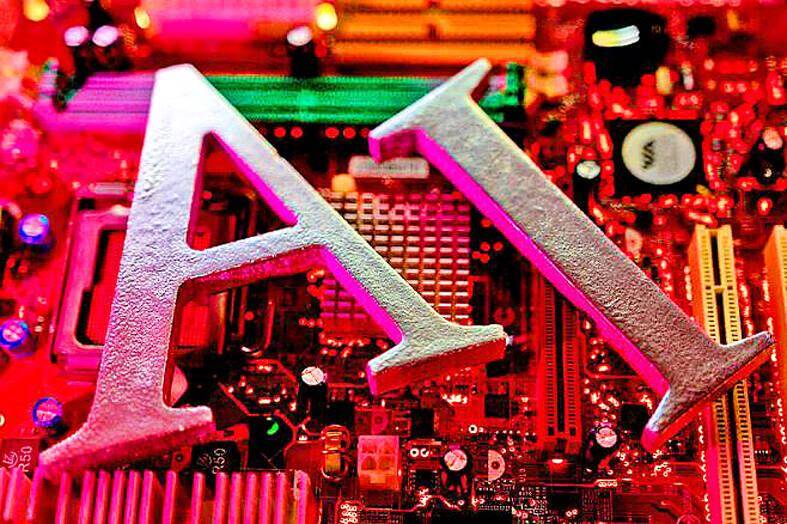Taiwan plans to launch its “Ten Major AI Infrastructure Projects” initiative, aimed at generating more than NT$15 trillion (US$510.86 billion) in economic value by 2040 as it strives to become a global leader in artificial intelligence (AI).
Premier Cho Jung-tai (卓榮泰) wrote on Facebook on Tuesday that Taiwan aims to leverage its information and communications technology (ICT) sector and world-leading semiconductor manufacturing capabilities to become a global AI influencer and a “smart technology island.”
Under the initiative, the nation has identified three core technologies as strategic priorities: silicon photonics, quantum technology and AI robotics.

Photo: Reuters
Silicon photonics is a technology that Taiwan Semiconductor Manufacturing Co (TSMC, 台積電), the world’s largest contract chipmaker, and many other firms in the industry are developing.
The government aims to position Taiwan as a global leader in silicon photonics by aligning the sector with future AI development needs.
Taiwan also hopes to become a key hub for AI robotics by tapping its hardware and ICT supply chains.
Industry groups, including one led by Hon Hai Precision Industry Co (鴻海精密) chairman Young Liu (劉揚偉), have backed the move with the formation of the Taiwan AI and Robots Alliance on Tuesday to support the local development of AI robotics and related ecosystems.
Taiwan also plans to establish a quantum technology industry chain.
The 10 projects also include the development of sovereign AI — the ability to build and control domestic AI technologies — and computing infrastructure, efforts to balance AI development across the country, and the introduction of AI across a wide range of industries.
The government has also called to expand investment in AI innovation, with more than NT$100 billion in venture capital funding, as it seeks to become a global hub for AI talent and investment.
The initiative targets the creation of 500,000 jobs and the establishment of three international-level research laboratories.

Taiwan is gearing up to celebrate the New Year at events across the country, headlined by the annual countdown and Taipei 101 fireworks display at midnight. Many of the events are to be livesteamed online. See below for lineups and links: Taipei Taipei’s New Year’s Party 2026 is to begin at 7pm and run until 1am, with the theme “Sailing to the Future.” South Korean girl group KARA is headlining the concert at Taipei City Hall Plaza, with additional performances by Amber An (安心亞), Nick Chou (周湯豪), hip-hop trio Nine One One (玖壹壹), Bii (畢書盡), girl group Genblue (幻藍小熊) and more. The festivities are to

Auckland rang in 2026 with a downtown fireworks display launched from New Zealand’s tallest structure, Sky Tower, making it the first major city to greet the new year at a celebration dampened by rain, while crowds in Taipei braved the elements to watch Taipei 101’s display. South Pacific countries are the first to bid farewell to 2025. Clocks struck midnight in Auckland, with a population of 1.7 million, 18 hours before the famous ball was to drop in New York’s Times Square. The five-minute display involved 3,500 fireworks launched from the 240m Sky Tower. Smaller community events were canceled across New Zealand’s

‘IRRESPONSIBLE’: Beijing’s constant disruption of the ‘status quo’ in the Taiwan Strait has damaged peace, stability and security in the Indo-Pacific region, MOFA said The Presidential Office yesterday condemned China’s launch of another military drill around Taiwan, saying such actions are a “unilateral provocation” that destabilizes regional peace and stability. China should immediately stop the irresponsible and provocative actions, Presidential Office spokeswoman Karen Kuo (郭雅慧) said, after the Chinese People’s Liberation Army (PLA) yesterday announced the start of a new round of joint exercises around Taiwan by the army, navy and air force, which it said were approaching “from different directions.” Code-named “Justice Mission 2025,” the exercises would be conducted in the Taiwan Strait and in areas north, southwest, southeast and east of Taiwan

UNDER WAY: The contract for advanced sensor systems would be fulfilled in Florida, and is expected to be completed by June 2031, the Pentagon said Lockheed Martin has been given a contract involving foreign military sales to Taiwan to meet what Washington calls “an urgent operational need” of Taiwan’s air force, the Pentagon said on Wednesday. The contract has a ceiling value of US$328.5 million, with US$157.3 million in foreign military sales funds obligated at the time of award, the Pentagon said in a statement. “This contract provides for the procurement and delivery of 55 Infrared Search and Track Legion Enhanced Sensor Pods, processors, pod containers and processor containers required to meet the urgent operational need of the Taiwan air force,” it said. The contract’s work would be